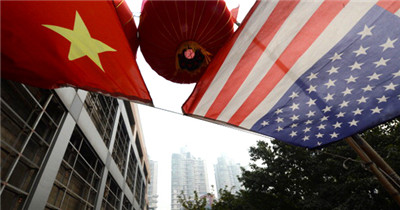(单词翻译:单击)
China’s decision to create a new development bank for Asia is proving a highly divisive enterprise. The Asian Infrastructure Investment Bank, due to open its doors later this year, has sparked deep divisions between Beijing and Washington. The latter argues that the bank will undermine existing international institutions and that it will be a vehicle for a broader expression of Chinese strategic interests. Now the AIIB has also become a source of major discord between the US and some of its chief allies, including the UK, which has decided to become a founder member of the new institution.
事实证明,中国为亚洲建立一家新开发银行的决定具有高度争议性。定于今年晚些时候投入运营的亚洲基础设施投资银行(Asian Infrastructure Investment Bank)已引发北京与华盛顿之间的深刻分歧。后者认为,亚投行将削弱现有国际机构,而且将成为更广泛地表达中国战略利益的工具。如今,亚投行也成了美国与其几个关键盟友(包括已决定成为这家新机构创始成员国的英国)之间主要分歧的一个来源。

That sparked an angry response in Washington, a sorry development that reflects the huge mistake the US has made in opposing a bank aimed at helping to meet Asia’s need for trillions of dollars of investment in energy, power, transportation, telecommunications and other infrastructure sectors.
这引发了华盛顿方面的愤怒回应,这一令人遗憾的动态反映出美国犯下了一个巨大错误——它抵制了一家旨在帮助亚洲满足能源、电力、交通、电信和其他基础设施领域数万亿美元投资需求的银行。
China and 20 other Asian countries agreed in October to establish the AIIB. Beijing will provide the bulk of capital and founding members include India, the second largest shareholder, as well as two Gulf Arab states, Kuwait and Qatar. A number of non-regional countries were invited to be founder members, an offer rejected by the US, which then lobbied allies, including Australia, South Korea, the UK and other European states, not to join.
去年10月,中国与其他20个亚洲国家一致同意建立亚投行。北京方面将提供大部分资本,创始成员国包括第二大股东印度以及两个海湾阿拉伯国家——科威特和卡塔尔。一些非亚洲国家也被邀请成为创始成员国。美国拒绝了这一邀请,而后还游说其盟友(包括澳大利亚、韩国、英国和其他欧洲国家)不要加入亚投行。
Washington argues there is no need for a new development lender, given the World Bank and the Asian Development Bank. There are dark mutterings in DC that AIIB’s Chinese leadership may ignore international lending norms and support projects that promote Chinese political, or even military, interests.
华盛顿方面认为,没有必要成立一家新的开发银行,因为已经有了世界银行(World Bank)和亚洲开发银行(Asian Development Bank)。华盛顿还出现了一些怀有恶意的流言,称中国人领导的亚投行可能会无视国际贷款准则、并支持那些增进中国政治乃至军事利益的项目。
The US is wrong to adopt this position. President Barack Obama has called for more Asian infrastructure investment. The existing institutions are only scratching the surface of those needs and have adopted different priorities in recent years. Competition is good for development lending as well as other markets. Concerns about backsliding from standards on transparency, procurement and anti- corruption are justified but the way to address them is to join the institution and work from within; it is nonsense to argue that carping from outside will be more effective.
美国采取这种立场是错误的。美国总统巴拉克•奥巴马(Barack Obama)已呼吁进行更多的亚洲基础设施投资。现有机构只能满足这些需求的很小一部分,而且近年来采取了不同的优先次序。竞争有利于开发贷款,也有利于其他市场。对透明度、采购和反腐标准倒退的担忧是合理的,但解决这些问题的方法是加入该机构,从内部实现变革;所谓在外面挑毛病会更加有效的说法纯属无稽之谈。
Most importantly, this issue represents a fresh skirmish in the inevitable competition for leadership of the world economy in the 21st century. As the incumbent power, the US naturally wants China to support the international rules and institutions that it has led for 70 years. As the rising power, China naturally challenges a status quo it had no role in creating and wants to begin shaping a modified order itself.
最重要的是,当前的问题代表着中美竞争中的新冲突。为争夺21世纪世界经济领导者的宝座,中美之间不可避免地会相互竞争。作为现任领导者,美国自然希望中国支持美国70年来一直领导的国际规则和国际机构。而作为一个崛起中的强国,中国自然想挑战自己未曾参与建立的现状,并开始自行打造一个修正过的秩序。
The US has correctly urged China to exercise leadership consistent with its expanding power, and to provide more resources to support development and other global goals. When the Chinese move in those directions, as they are doing with the AIIB, it is short-sighted and hypocritical for the US to seek to block them. This is especially true when the Obama administration has not persuaded Congress in four years to adopt legislation to provide enhanced roles for China and other emerging economies in the International Monetary Fund, as agreed by all other countries; and has opposed increasing the capital of the Asian Development Bank.
美国敦促中国行使与其不断增强的实力相一致的领导力、为支持发展和其他全球目标提供更多资源,这是正确的。而当中国朝着这些方向前进,就如中国在亚投行这件事中所做的那样,美国却试图阻止中国,这是短视和虚伪的。考虑以下两点就更是如此了:奥巴马政府4年来都未能说服国会通过相关立法、以让中国和其他新兴经济体在国际货币基金组织(IMF)中发挥更大作用,尽管这已是其他所有国家的共识;此外,美国还反对亚洲开发银行增资。
This US hostility reinforces the Chinese view that US strategy is to contain and suppress it; so increasing rather than decreasing the prospect of uncooperative Chinese behaviour. The UK and other US allies, by contrast, are wise to accept China’s invitation to join.
美国的敌意使中国愈发认为美国的战略是遏制和压制中国,这加大、而非减小了中国采取不合作行为的可能性。相较之下,英国以及美国的其他盟友明智地选择接受中国的邀请、加入亚投行。
The US should reverse course. It should join the bank and persuade Congress to provide the small amounts needed to fund a minority share. It should bless the desire of its friends in Asia and Europe to join, to help counter any untoward Chinese actions.
美国应该调转方向。它应加入亚投行,并说服国会提供取得亚投行少数股权所需的小笔资金。美国应鼓励其亚洲和欧洲朋友加入亚投行,以便在中国采取任何不利行动时帮助美国一同加以反对。
And it should encourage the World Bank and the other current multilateral lenders to co-operate closely with the new institution. The AIIB initiative can then play a positive role in the world economy and capitalise on China’s growing willingness to exercise constructive global leadership.
美国还应鼓励世行和其他现有多边贷款机构与亚投行密切合作。这样,亚投行项目就能在世界经济中扮演积极角色,并受益于中国不断增强的发挥建设性全球领导力的意愿。
The writer is director emeritus and senior fellow at the Peterson Institute for International Economics
本文作者是彼得森国际经济研究所(Peterson Institute for International Economics)荣休所长、高级研究员


